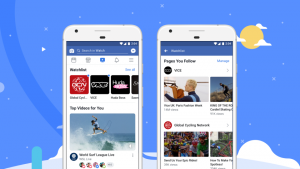
After more than 40 years of operation, DTVE is closing its doors and our website will no longer be updated daily. Thank you for all of your support.
Facebook takes its social video ambitions to the world
Facebook rolled out its Watch platform globally this week, stepping up its efforts in an increasingly competitive online video space. But how hard will it be for the social media giant to compete against its FAANG peers like Netflix, YouTube and Amazon?
 Since Facebook launched Watch in the US a year ago, it has stressed that the platform is as much about interacting with friends and fans as it is about discovering video content.
Since Facebook launched Watch in the US a year ago, it has stressed that the platform is as much about interacting with friends and fans as it is about discovering video content.
“Over the past year, we’ve made the experience more social — like making it easier to see which videos your friends have liked or shared, creating shows that have audience participation at their core, and opening Watch to videos from Pages,” said Facebook’s head of video, Fidji Simo, this week.
This is part of Facebook’s broader efforts keep users engaged. In January the social network announced a “major change” to its news feed, placing more focus on personal connections and de-prioritising posts from businesses, brands and media.
Speaking on the company’s first quarter earnings call in April, CEO Mark Zuckerberg explained that the move was a deliberate effort to steer users away from “passive consumption to encouraging meaningful interactions” – even when watching video.
This year the company has launched interactive video features like Watch Party, which lets users view videos with their friends. Meanwhile, Facebook Watch’s aim has always been to provide a space for users to connect with people that have similar interests.
Last year Facebook CFO David Whener said on a company earnings call that Facebook is “investing aggressively” in video content to support its Watch tab, while Zuckerberg elaborated that this spend will go towards ‘lighthouse content’ that is “centred around things that people want to talk and connect around, that give people sense of pride and bring people together.”
Among the already popular Watch content that Facebook highlighted this week was: Jada Pinkett Smith talk show, Red Table Talk; beauty mogul Huda Kattan’s behind-the-scenes show Huda Boss; and live Major League Baseball games.
Sport is a key focus area for Facebook and has ready-made fandom that it can tap into. Earlier this year it appointed Eurosport CEO Peter Hutton to help secure live sports rights, and in August it landed free-to-air rights for UEFA Champions League live matches across Spanish-speaking territories in Latin America from 2018-2021.
However, sports is an area where other online giants are also starting to play, with Amazon recently taking Premier League and US Open Tennis Championships rights, and YouTube doing a US deal with the Los Angeles Football Club to broadcast the team’s locally televised matches via YouTube TV.
On the entertainment front, Facebook hired the head of BuzzFeed Studio, Matthew Henick, in March to lead global video content strategy and planning. The company said this week that it is also expanding its ‘ad breaks’ program so more partners can make money from their videos.
While this will be tempting to content creators interested in using the Watch platform, whether it will be enough to tempt them away from YouTube, where many careers have been made, is yet to be seen. The same question hovers over IGTV, Facebook-owned Instagram’s long-form, vertical video service that went live in June.
“Every month, more than 50 million people in the US come to watch videos for at least a minute in Watch — and total time spent watching videos in Watch has increased by 14-times since the start of 2018,” said Simo at Facebook this week.
However an independent study released by The Diffusion Group just last week claimed that Facebook Watch “continues to face significant challenges regarding feature awareness and use,” with 50% of polled US Facebook users having never heard of Facebook Watch and a further 24% saying they had heard of it but never used it.
Facebook Watch faces stiff competition. On the one hand, there is the high-end and highly bingeable fare found on Netflix. On the other, YouTube is already home to a new generation of social superstars and is also investing in content for its YouTube Premium service, which launched YouTube in 17 countries across the Americas, Europe and Asia in June.
What Facebook does have on its side is enormous scale and considerable resource. The social network currently has 2.23 billion monthly active users and in its most recent quarter generated revenue of US$13.2 billion and net income of US$5.1 billion. If anyone can make a go of a new social video platform, it’s Facebook.


